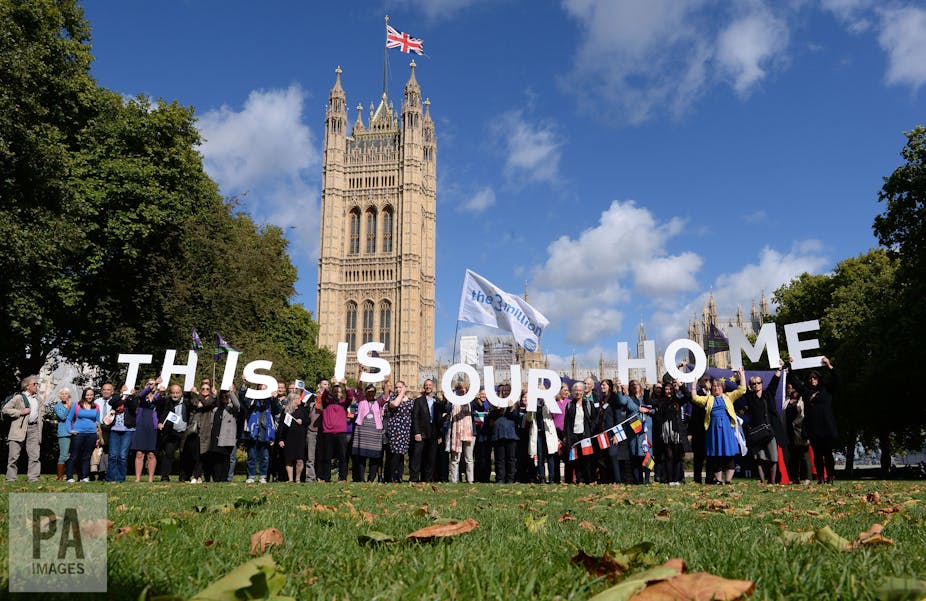After thousands of EU citizens gathered in Westminster on September 13 to lobby for their rights after Brexit, the Home Office sent an email to everyone who had registered for progress updates from the government. It was entitled “EU citizens living here are vital”.
While the government is trying to reassure EU citizens it “is committed to reaching agreement on citizens’ rights as soon as possible”, the recent leak of a draft immigration policy document implies that after Brexit, they will be living under an increasingly hostile environment. Showing documentation will become a norm.
My own ongoing research with Carla Xena suggests that the policies that work best at integrating migrants are actually those which offer incentives and rewards for long-term settlement and commitment to a host country. But the way to do this will not please those who believe in curtailing rights and making it impossible for migrants to settle. Nor will it please those who favour full freedom of movement after Brexit.
A coconut policy
There is increasing evidence from economics and political science on what the best kind of integration policy should look like. The answer: some restrictions and selection at the border – usually in terms of a migrant being required to have a job prior to arrival – with very inclusive rights and security of status once the migrant has crossed the border. This “coconut” type of policy, combining a harder surface with a softer inside, has proved to increase the economic and political integration of migrants.

Raising the bar of border control can appease the anxieties of significant portions of native populations who feel threatened by immigration. Public concerns about immigration are reshaping party systems across the Western world, so it is not realistic to ignore demand for immigration control. Some form of Brexit will have to happen, largely because of this.
If a country requires migrants to have a job offer prior to arrival, it can better synchronise migrants’ abilities with the needs of the host labour market. It can also keep an eye on numbers. Higher bars at the border may also attract the most motivated migrants and incentivise long-term planning on the immigrant side, given the higher effort involved in the act of migrating.
We are currently researching the impact of border control on migrants’ attitudes towards the political system in their host country. We’ve found that there is only a noticeable positive effect when harder border control is combined with clearly liberal and inclusive integration regimes. This means high levels of security status, equality of rights, possibilities of long-term residence, and family reunification.
This means policies which aim to reduce immigrant numbers, connecting them with labour market needs, but rewarding effort and giving people an incentive towards long-term settlement. The latter is consistent with recent research in sociology and politics showing that naturalisation has a strong impact on migrant integration.
Soft landings help integration
What our research is beginning to show is that policies combining harder entries with softer landings increase levels of democratic satisfaction and political trust by immigrants in the host country, which are good deterrents of future radicalisation and migrant social unrest. This type of policy can also have positive effects among non-naturalised migrants, who are, after all, the biggest immigrant group.
Our analyses focus on two strategies and use data from the Immigration Policies in Comparison project, which measures immigration policies in all OECD countries, and the European Social Survey.
The relationship holds across 25 countries for over a decade between 2002 and 2013 – the year our data stop. The 2005 German Immigration Act is a good example of a “coconut” type of policy for some non-EU nationals. Without softening entry requirements, this policy replaced a five-year residence limit with permanent residency, and simplified bureaucratic procedures to obtain permits. We’ve found that the relationship between political trust and immigration policies only decreases again when the border is made too hard to pass, as in some Eastern European countries such as Poland.
Commonwealth citizens
Using data from the 2010 Ethnic Minority British Election Study, we also narrowed in on the UK to analyse the political attitudes of different cohorts of Commonwealth migrants who arrived in the UK under different immigration policy regimes.

Prior to 1962, citizens from the Commonwealth benefited from free movement and de facto equal citizenship status. After increasing social unrest and concerns about immigration, the 1962 Commonwealth Act certified the beginning of the end of post-colonial Britain. The act established border controls for the first time, and entry was subject to proof of work contract at any level of skill. Once past the border, Commonwealth migrants were subject to similar rights to those that they enjoyed before the policy change, including full right to family reunification. A more restrictive immigration bill was introduced in 1971, making this nine-year period a good example of a “coconut” policy in action.
Our initial statistical analyses show that, four decades later, Commonwealth migrants who arrived in the country between 1962 and 1971 still show higher levels of political integration than those who enjoyed the benefits of unrestricted movement before 1962, even when we controlled for length of stay, citizenship status, and other factors. The same is not true, however, for subsequent cohorts of migrants who saw their security of status and access to citizenship increasingly diminished.
If the purpose of immigration policy is to minimise social cohesion problems, the path is not to bother migrants all along the migration process. The government’s will to control immigration numbers is perfectly compatible with offering incentives for long-term settlement. In fact, rewarding effort seems to be associated with the best outcomes.

